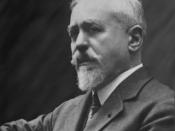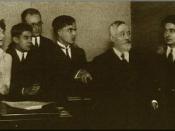Paul Dukas
Born October 1, 1865 in Paris, France
Died May 17, 1935 in Paris, France
Nationality: French
Style/Period: Romantic
Paul Dukas was born in Paris, France on October 1, 1865. He was a student at the Paris Conservatory where he studied piano, harmony, and composition. He won the Prix de Rome for a counterpoint and fugue in 1886 and again in 1888 with the cantata, Velleda.
As mentioned, Paul Dukas studied at the Paris Conservatoire were he was a pupil of Bizets' friend Guiraud. Dukas devoted his time to musical criticism and orchestration, he was the music critic for the Revue Hebdomadaire and Gazette des Beaux-Arts and he was a professor of orchestration at the Conservatoire. It is rumored that his strong critical sense led him to intentionally destroy a number of his own compositions and only allow an utterly small number of his compositions to be published. Nevertheless, he remained an influential and respected as both teacher and critic when he left the Conservatoire he was able to become totally devoted to musical criticism and orchestration.
He was a friend of Debussy's and developed some of that composer's techniques in his own works.
The symphonic scherzo L'Apprenti Sorcier is by far the best known composition by Dukas. (inspired by Goethe's poem Der Zauberlehrling) The music was worldly popularized by Walt Disney, when he included a pictorial version of it in Fantasia with Mickey Mouse as the sorcerers' naughty apprentice.
Dukas' most notable works
Orchestral Music
Symphony: Early overtures Götz von Berlichingen and King Lear, L'apprenti sorcier (The Sorcerer's Apprentice) and overture Polyeucte for orchestra Dukas only symphony, a work that deserves more attention than it has generally received.
Chamber Music: Villanelle for horn and piano (also orchestrated)
Piano Music: piano sonata La plainte, au loin, du faune..., Prélude...


